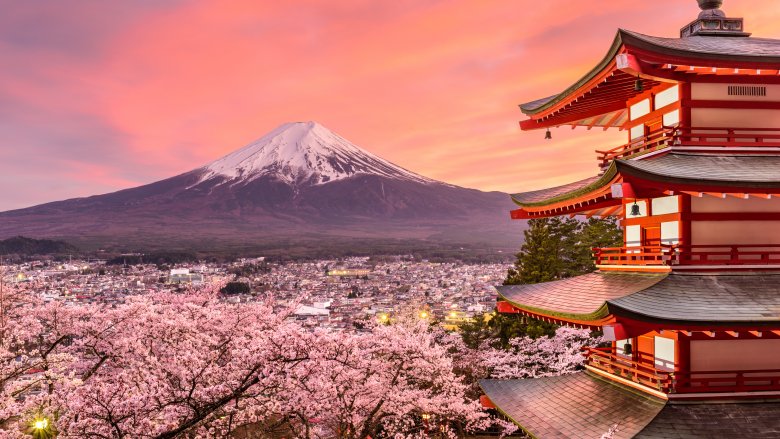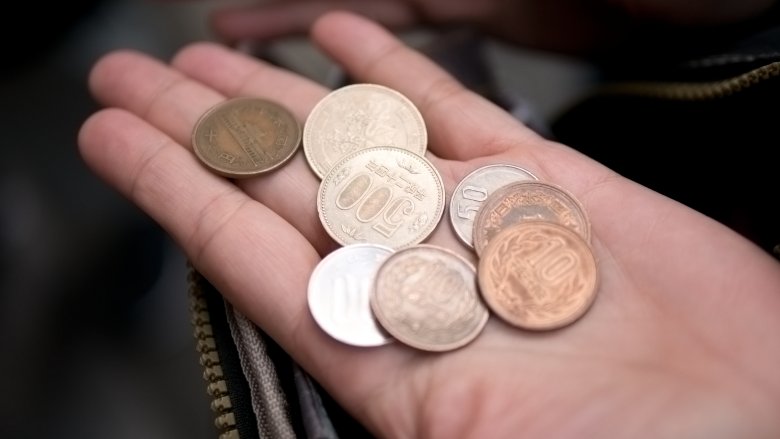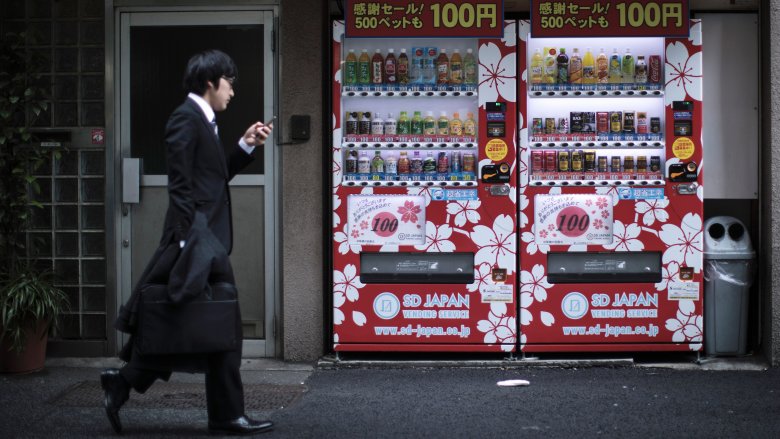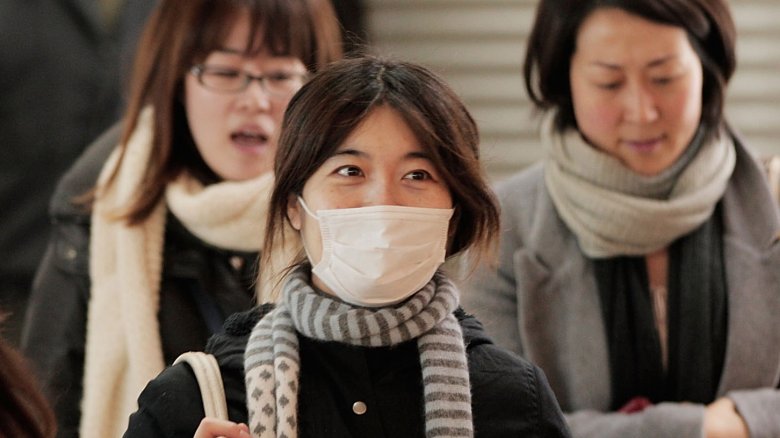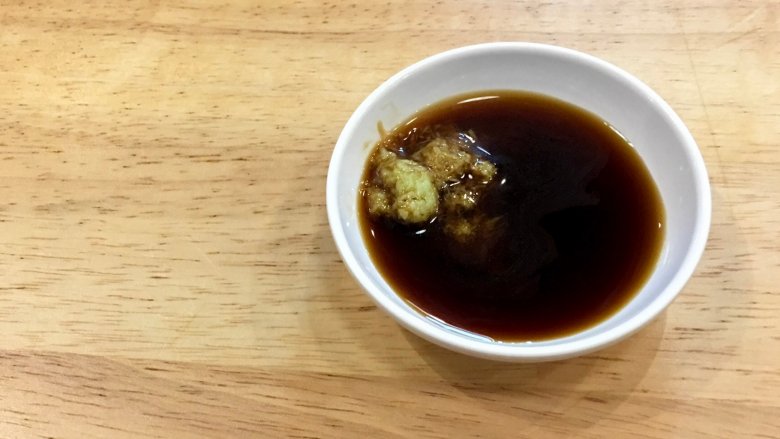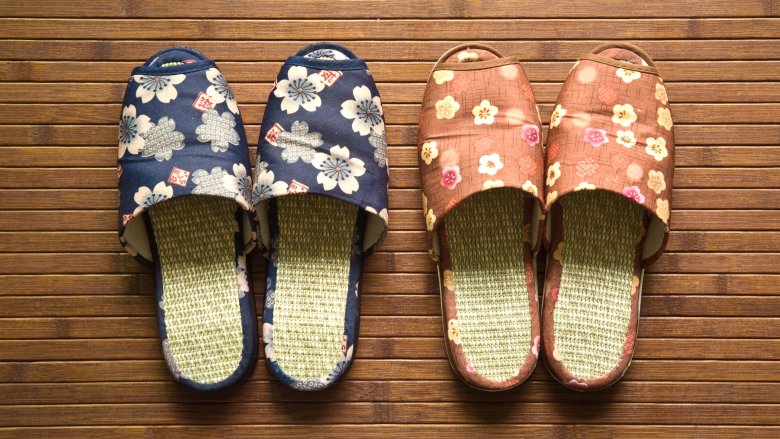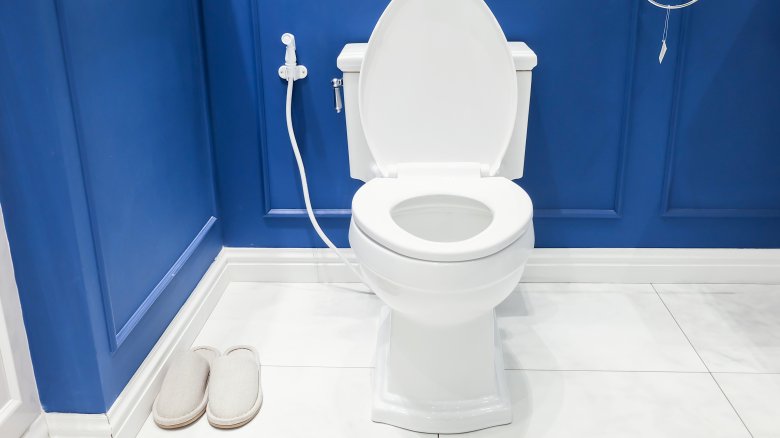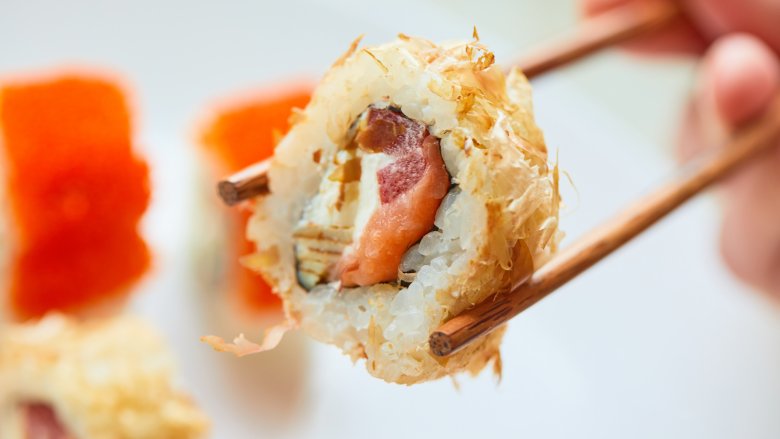11 Things You Shouldn't Do In Japan As A Tourist
Traveling to just about any foreign land is generally fraught with some sort of peril, even if it's Florida. (In fact, maybe even mostly if it's Florida.) But when you travel to a country where you aren't familiar with the customs, it's a very good idea to do a little reading up first, lest you make the sort of mistake that will get you thrown out of homes and eating establishments, or at the very least peg you as an obnoxious foreigner.
Lots of countries have social rules and expectations you probably aren't aware of, but some nations, including Japan, have enough of them to fill an entire manual. We're not going to print up a 400-page guidebook on Japanese culture etiquette, but if you're planning to visit the Land of the Rising Sun anytime soon, it's a good idea to understand at least the basics. And there are a lot of basics, so good luck not doing these things when visiting Japan.
Cheapskates rejoice!
If you always balk at having to fork over $5.39 on every $36 dining ticket, you should totally move to Japan. Japanese service workers not only do not expect a tip, if you try to give them one, they will probably reject it.
That's largely because Japanese service workers don't get crappy pay with the expectation that customers will make up for the gap in their wages. According to Boutique Japan, most waitstaff, hotel staff, taxi drivers, and bartenders will give you unimpeachable service without an expectation of an extra financial reward, simply because unimpeachable service is embedded in the Japanese culture. Also, it doesn't hurt that Japanese service workers don't have to worry that their customers' own personal tipping philosophies might be the only thing preventing them from making ends meet, so their jobs lack some of the stress of similar American positions.
So even though visiting Japan may be sort of taxing in other ways if you don't do your cultural homework, there are definitely some perks, especially if you're the sort of person who only tips because your friends are watching or because you don't want to get spit in your food.
Don't walk and chew gum. Or anything else.
Americans are always in a hurry. Americans are in such a hurry that we grab lunch at the drive thru and stuff our faces with one hand while haphazardly holding onto the steering wheel with the other. We invented the expression "portable snack." Our computer keyboards have 1.4 times as much bacteria per swab as a toilet seat, in part because we eat while sitting at our desks. (The appalling lack of American bathroom hygiene probably also has something to do with it.)
According to This Japanese Life, the Japanese are a little more mellow about eating and drinking. Specifically, they don't walk around while doing either one. This might seem kind of odd in a culture that adores vending machines, but the Japanese have not come to the same conclusion about quick-service food that we have. In Japan, food obtained quickly doesn't necessarily have to be eaten quickly. In fact, the Japanese will often get a snack or soda out of a vending machine and then stand there, next to the vending machine, until they've finished the item.
So do the Japanese have a reason they can point to for their moratorium on eating and drinking on the go? Tofugu says it's just "kind of a low class thing to do." Others can't really point to the reason, because like not-tipping, it's just part of the Japanese culture.
Surgical masks are not (usually) a fashion statement
You quite often see photos of people in Japan wearing surgical masks. So often, in fact, that you might actually wonder if surgical masks are just a fashion thing. Meanwhile, in America, we cough into the open air, sneeze all over our hands moments before grabbing doorknobs, and sneak out of restrooms without washing up. So it's no wonder we look at those photos of the Japanese in surgical masks and go, "Uhhhh, sur — gik — all — mask?"
According to Japan Today, in the Japanese culture, it's not nice to share germs. So if you're sick and you must leave your home, you put a surgical mask over your nose and mouth because that's the Polite Thing to do. Surgical masks are also worn out of an abundance of caution — if your commute regularly has you in a packed train during flu season, it's probably not a terrible idea to put on a surgical mask.
And if you're going to wear a surgical mask, it's also not a terrible idea to pick one that matches your outfit or has your favorite anime character on it, so in a sense, it can kind of be a fashion statement, too, although it's not usually worn specifically to look cool. So why don't Americans do the same thing? Mostly because someone might look at us funny. We're a practical lot, aren't we?
The horrible misuse of soy sauce
Here's a tip — if you dine out in Japan, learn all the rules about soy sauce first. Because the Japanese take soy sauce etiquette very, very, seriously.
You're probably used to dumping soy sauce all over your white rice when you're eating in American Asian restaurants, but don't do it in Japan. Soy sauce in Japan is not meant for drowning out the subtle flavor of white rice, and white rice does actually have subtle flavor — it's just that American palettes aren't generally tuned into it.
According to Japan Today, another big soy sauce etiquette mistake that American diners make is mixing wasabi directly into soy sauce. For a start, it's kind of insulting to the chef, since he worked very hard to make sure that your nigiri has exactly the right amount of wasabi and soy sauce built in. If you must dip, you're expected to put your wasabi on your sushi first, and then dip it in the soy sauce fish-side down. Or just get takeout and go crazy in the privacy of your hotel room.
You really should think about where your gross shoes have been
Wearing shoes in the house is just not something people do in Japan. It's kind of akin to the American tradition of not putting your feet on the dinner table. Almost zero Americans would be okay with guests putting their dirty boots on the same surface where the cups and plates go, and in Japan it's thought of as equally gross to do the same thing to the floor.
According to Guidable, you should always remove your shoes immediately after entering a Japanese home (and also when entering most historic buildings). This means you always need to have a neat, stain-free, and hole-free pair of socks either on your feet or stashed away on your person so you can put on the slippers that your host will provide for you. Because putting on slippers that have also been worn by every other person who's ever been a guest in that home isn't gross at all.
Anyway, once you've donned the slippers there are even more rules you need to follow — you can wear them on hardwood but you can't wear them on carpeted or matted floors because even though the hardwood inside a Japanese home is impeccably clean compared to an American home, your slippers still might have dirt on them that could wind up on the carpet. The Japanese must save loads on professional carpet cleaning.
Also, toilet slippers
And because putting on a pair of slippers every time you enter a new building isn't enough, you're also expected to don a special pair of "toilet slippers" designed specifically for use in the bathroom. That makes a certain kind of sense because bathroom germs have a greater ick factor than regular floor germs do. On the other hand, it's a little cringeworthy to imagine just how many bathroom germs belonging to how many dozens of former guests might be congregating on the bottom of those bathroom slippers you're being forced to borrow every time you have to use the loo. And don't forget to remove the toilet slippers after you leave the bathroom because if you start tracking all those bathroom germs around the house, the horrified stares of the homeowner and anyone else who happens to be present will descend upon you like a plague of locusts.
The good news is that many modern Japanese bathrooms are equipped not only with Western-style toilets, but with toilets that have lids that open automatically, thus avoiding the gross factor of having to touch the toilet with your hand, plus heated seats and butt-showers. Though if you're going to be visiting public spaces you may have to bring a handkerchief because you won't always be supplied with towels for drying off after your butt-shower, and that could be embarrassing.
Respect the chopsticks, man
Japanese food etiquette doesn't end with your soy sauce, so if you're going to eat out it will behoove you to also understand all the millions of things you're expected to do with your chopsticks.
According to Japan Today, you should always pick up your bowl before you pick up your chopsticks. You are also expected to put your chopsticks down before picking up a different bowl. And being indecisive about what you're going to eat next is bad form. So don't wave your chopsticks around over the food before deciding what to take — that's so rude that the Japanese even have a derogatory name for it: hesitating chopsticks. There's also "empty chopsticks," which refers to the even more appalling act of touching something with your chopsticks and then not actually picking it up, and "transition chopsticks," which means you've gone straight from one side dish to another without eating some rice in between.
You should also avoid resting your chopsticks on your bowl, rubbing your chopsticks together to remove splinters (it implies the restaurant was crass enough to give you low-quality chopsticks), standing your chopsticks up in your rice (because that's what they do as an offering to the dead during a funeral), passing food with your chopsticks (because ew), and pointing at people with your chopsticks. So maybe just eat at McDonald's when you're in Japan. Wait, you don't have to use chopsticks at McDonald's, too, do you?
Because public nose-blowing is just gross, America
In much of the West, sniffling is considered gross. For some reason, carrying a snot-laden tissue around in your pocket isn't considered gross. We have a long and noble tradition of carrying around the stuff that comes out of our noses. When you have a cold you are expected to honk into your tissue wherever you happen to be because continuously sniffling and snorting is rude and disgusting and typically only perpetrated by children and by adults whose parents never taught them manners.
In Japan, the opposite is true. According to the Independent, if you have a runny nose in Japan, you're expected to sniffle until you can find a bathroom. Then (after donning your bathroom slippers, of course), you may honk and blow as much as you like, just so long as you are out of sight and earshot of anyone who might witness the disgusting practice. If there is no bathroom nearby, go ahead and snort and sniffle as loudly as you need to. No one in Japan finds that rude or gross.
No PDAs, please
America seems to be more or less divided on whether public displays of affection are socially acceptable. No one really loves to see a young couple smacking and groping each other on the subway, unless we intend to gripe about it on Twitter. On the other hand, there seem to be plenty of people who do think it's socially acceptable, but they're usually the people who are doing it.
In Japan, the moratorium against public displays of affection goes beyond the "get a room" type stuff, though. According to Japan Today, many Japanese avoid attracting attention to themselves and will always behave modestly when in public. That means everything from face-sucking to public pecks on the cheek and putting your arm around someone could be considered rude. Even publicly gazing fondly into the eyes of your beloved might be frowned upon, depending on where you are.
Western tourists might roll their eyes at these "silly" rules, but in Japan, even small displays of affection have been kept out of public places for so long that a peck on the cheek seems just as outrageous as that face-sucking couple on the train. And really, if you can't keep your hands off each other, it was probably a terrible idea to go on vacation to Japan when you could have rented a hotel room at home for a lot less money.
A fair point
Unless you took your Rosetta language software really, really seriously in the months prior to your Japanese adventure, the chances are pretty good that you're only going to know a handful of Japanese words before you disembark in the Land of the Rising Sun. So apart from "please," "thank you," and "where is the bathroom," you may find it challenging to make yourself understood, and you may be tempted to revert to the oldest form of human communication: pointing at things.
Now, that presents a two-part problem. Your mom probably told you not to point because it's rude. But you probably do anyway because everyone does, whether it's pointing at something in the distance or gesturing to a particular person in a group conversation. And when you're in a situation where you can't speak the language, it's even more tempting to point.
You're actually better off just downloading a Japanese phrase app because in Japan, pointing is just plain rude. According to the Japan FAQ, you have to follow specific rules even if you're just pointing at yourself — if indicating yourself in a conversation, you should point at your nose, not at your chest. You shouldn't point at someone with chopsticks, and you really shouldn't do it with your finger, either. If you must indicate a particular person, you should use your whole hand.
Sleep well because it's rude to yawn
For most people, yawning is involuntary. Humans are born knowing how to yawn. It's one of the five basic instincts of babyhood: eating, sleeping, crying, pooping, and yawning. Learning to suppress a yawn is not actually that easy to do, but you can practice while you're reading about yawning right now. In Japan it's considered rude to yawn openly. Happily, you at least get to cover your mouth if you can't stop that yawn, but too much yawning shows fatigue or boredom, which is why it's considered taboo. The Japanese culture values endurance, which means it's sort of a sign of weakness to admit to being tired or bored.
Ironically, the culture that frowns upon yawning is also the culture that finally figured out why yawning is contagious — it's evidently not because of empathy, which was once commonly believed, but because of "perceptual sensitivity," or the simple ability to identify when someone is about to yawn.
It isn't just yawning, though. An open mouth that isn't talking or having food stuffed into it is also frowned upon, mostly just because it looks like a yawn. So staring slack-jawed at something or breathing through your mouth because your nose is stuffy and you aren't allowed to blow it are also things you should not be doing, which frankly is starting to make those anime-decorated face masks sound pretty danged good.
